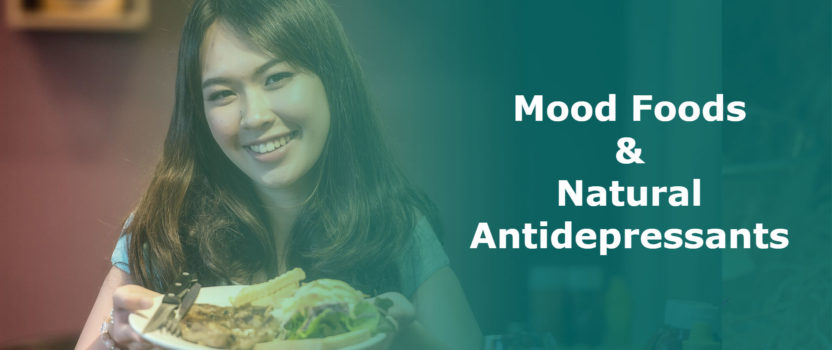Mood Foods and Natural Antidepressants (international happiness day – march 20th)
Next time you’re feeling stressed, irritable or low (or all the above) give a thought to what you have (or haven’t) been eating. It’s obvious that food and drink affect our mood – just think how we perk up just at the sight and smell of our favourite fare. But there’s more to it than just our eyes and nose. What we eat and drink has a direct effect on the neurotransmitters (brain chemicals like serotonin and dopamine) that influence the way we think, feel and behave. Fortunately, this means we have the power to improve our mood by making inspired food choices.
Stress
Eating foods rich in vitamin C can reduce both physical and psychological effects of stress by curbing cortisol levels – the hormone responsible for the fight or flight response. All fruit and vegetables, but especially citrus, kiwis and peppers are good sources of vitamin C.
Insomnia
Make sure you’re getting enough tryptophan. Apart from its crucial role in making serotonin (the feel-good hormone), this important amino acid is also needed to produce melatonin – the hormone that tells us its time settle down and switch off for the night. Poultry, eggs, brown rice, tofu, oats, dairy and nuts are all good sources.
Brain fog
Eating a rainbow of brightly coloured fruits and vegetables is an effective way to get a wide variety of antioxidants to support our vascular health and protect our neurons from the damaging effects of oxidative stress. Omega 3 fatty acids, found in oily fish (salmon, mackerel, sardines and anchovies), nuts and seeds are not only critical for keeping the brain well-nourished and functioning properly, but low levels are repeatedly linked with depression and low mood. If you don’t like oily fish and can’t eat nuts a daily supplement is a good idea.
Low mood
Serotonin-enhancing drugs abound (and not without side effects), but there are plenty of ways to boost our levels naturally. Greens (spinach, kale, arugula, celery, cabbage, cauliflower), lentils, oranges and papaya are good sources of vitamin B6 and folate – vital for producing serotonin and dopamine (low levels of both are linked to depression). Chilli peppers and cayenne contain capsaicin, a compound that sends a message to the brain to release endorphins – the body’s natural painkillers that enhance mood. Happily, chocolate boosts serotonin and dopamine, while carbohydrates in general increase serotonin levels (hence the cravings when we’re feeling down), by boosting our brain’s ability to use tryptophan. Just try to opt for healthy complex carbs like whole grains and vegetables.
Of course, there are many things we consume that work the other way. Find out exactly which foods and drinks negatively affect your mood and energy and start improving your overall health now by doing the Foodwise “Energy and Mood” plan now at: https://www.foodwise.life/program/energy-mood


Leave a Reply
Your email is safe with us.
You must be logged in to post a comment.